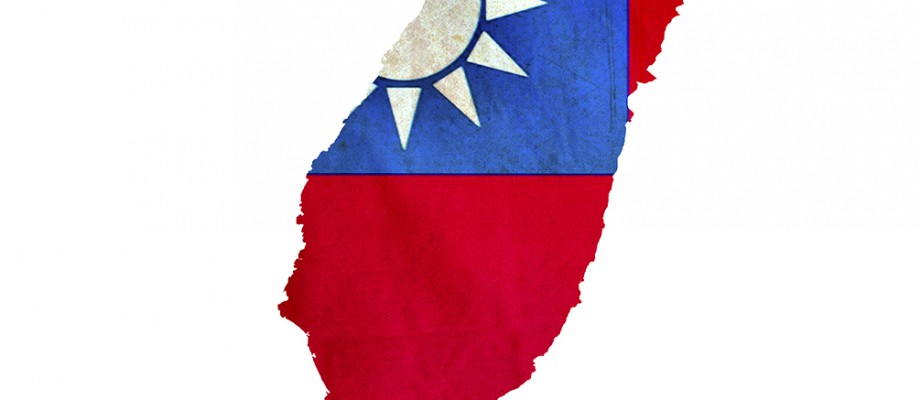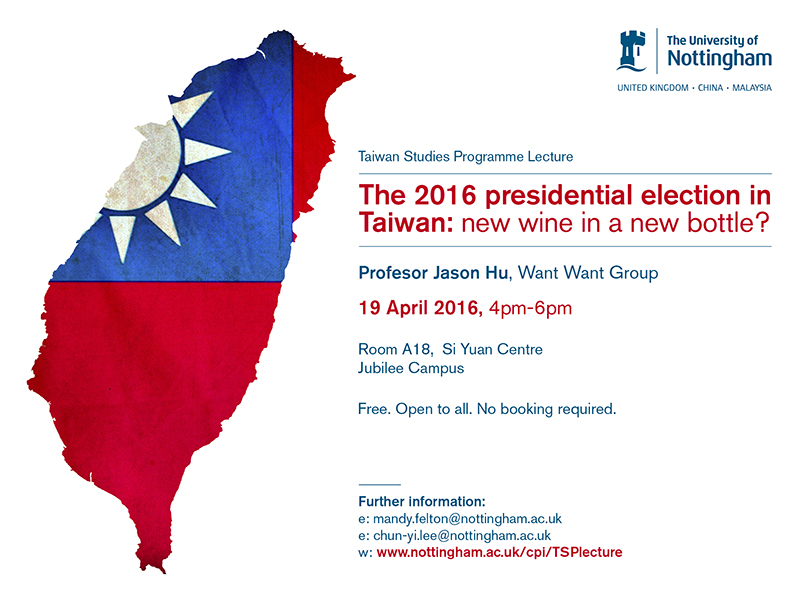The 2016 presidential election in Taiwan: new wine in a new bottle?

The Taiwan Studies Programme is delighted to announce that Professor Jason Hu, of the Want Want Group and former Mayor of Taichung, will present the Taiwan Studies Programme Lecture on ‘The 2016 Presidential Election in Taiwan: New Wine in A New Bottle?’.
Abstract
The result of the January Presidential election in Taiwan was almost a foregone conclusion! Long before the balloting day, practically all polls showed that Chairperson Tsai of the Democratic Progressive Party (DPP) would win. Still, certainty does not mean clarity. By now, about three months after the victory, Tsai has not yet unveiled what her new policy towards Mainland China would be, despite the anxiety on both sides of the Taiwan Straits keeps mounting.
Perhaps Beijing may not like to be described as “anxious” to wait for Tsai’s revelation. Repeatedly, before and after the election, Beijing let it be known that, come what may, Beijing will not change its current position. Interestingly, Tsai also claimed all along that her policy towards Beijing will not be too different from the present situation- that she will maintain the “status quo”.
Politics can be very tricky in the cross- straits interaction. When the KMT was in power, Beijing and Taipei worked out a formula that they both agree to: “the 1992 Consensus”, which means that both sides agree that there is one China and that “China” may have different meanings to each side. To be frank, this in effect means that Beijing would say that there is only one China, which is the People’s Republic of China. Taipei would say that we accept there is one China, and that is the Republic of China. Hence the “92 Consensus” is also known as “One China with two interpretations”.
What carries in this expression is the fact that “Taiwan” as an independent state finds no room in it, but the DPP has never officially given up that “Independence” option. This is why, while maintaining the wish for “status quo”, Tsai obviously and deliberately avoids facing the issue of “92 Consensus”.
It is hard to keep everyone waiting. By the 20th of next month, when Tsai takes office, she is expected to clarify her position. Otherwise, there may be a de facto break-off of many of the exchange and cooperation programs between Taipei and Beijing. And Taiwan may suffer more than Beijing.
Tsai may find something to say, perhaps a softer tone that could show Beijing she has plenty of good will, so Beijing would agree to move on further. Even so, it would be a bumpy road ahead towards uncertainty. To be honest, even Tsai says what Beijing hopes she would say on 20th May, one could still not be sure of the near future on cross-straits relations.
A transition of Taipei-Beijing relations after eight years of KMT government has a great deal of implications. The new government of Tsai may not find it easy to open up a new chapter of relations with Mainland China. Many other issues such as domestic economic development, US-Taiwan relations, Taiwan’s role in the South China Sea dispute, Taipei’s diplomatic struggle in the international arena are all still critical challenges ahead!
Free, open to all. No booking is necessary.
For more information, visit the China Policy Institute website. Alternatively, email chun-yi.lee@nottingham.ac.uk or mandy.felton@nottingham.ac.uk
Tags: China Policy Institute, public lecture, School of Contemporary Chinese Studies, Taiwan, Taiwan Studies Programme
Leave a Reply
Upcoming Events


